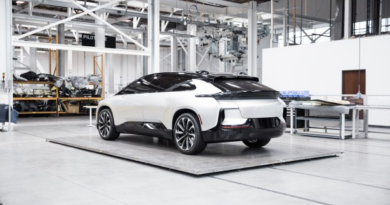Chinese EVs have yet to succeed in Europe. The Middle East could be different
For Chinese electric car manufacturers, Europe has long been a priority destination for international expansion. With its affluence, environmental consciousness, and relatively friendly attitude towards China, the continent has attracted established players like BYD as well as emerging brands like Nio and Xpeng.
Despite their ambitious plans, Chinese EV makers yet to achieve the level of success they had hoped for in Europe. In 2022, BYD held a mere 0.3% market share across 14 major European markets, while Xpeng and Nio, which both entered Europe in 2021, each accounted for 0.1% of the region, according to auto data tracking site EU-EVs. Western carmakers continue to dominate the market, with Tesla enjoying a 15% share, Volkswagen with 11.3%, and BMW with 6.2%.
It’s too soon to say if China’s ambitious EV makers will ever establish a strong foothold in Europe, but the early tepid performance is driving them to hedge their bets. They are setting their sights on a region halfway between Europe and China — the Middle East.
As countries around the world accelerate efforts to phase out fossil fuels, the oil-rich countries in the Middle East are also joining the fray to electrify the auto industry. In a controversial move, the United Arab Emirates, a country known for its abundant oil reserves, will host the 2023 United Nations-sponsored climate talks, more commonly known as COP28.
“Oil is relatively cheap [in the Gulf countries] but can be exported for a big profit margin. The money made from export can then go towards subsidizing the domestic EV industry,” Emma Meng, an auto influencer with over one million followers on Weibo who is also an EV consultant based mostly in the UAE, explained in an interview with TechCrunch.
Chinese electric vehicle manufacturers are taking note of these developments. The Middle East, with an EV market that is still nascent, offers a wealth of potential for growth. But the same challenges that Chinese EV makers have faced in Europe will arise once again in this land of opportunities.
Pushed to go beyond China
China’s EV makers feel an increasing urgency to expand overseas as consumer demand weakens amid an economic slowdown and Tesla’s aggressive price cuts heighten domestic competition.
The price war started by the American titan has triggered some 40 Chinese EV brands to slash prices. Even Nio, which prides itself on its premium brand image and pledged not to join the price war, gave in eventually.
“The Chinese market is too cut-throat. EV makers have no choice but to get out,” suggested Meng.
The momentum in Europe is driving Chinese EV makers to look elsewhere. Meanwhile, the increasing level of government-level interactions between China and the Middle East is offering reassurance for automakers to invest in the region.
In early December, President Xi Jinping traveled to Saudi Arabia, marking one of his first trips abroad since China closed its borders to control the COVID-19 pandemic. His meeting with Crown Prince Mohammed bin Salman was widely viewed as China’s attempt to assert more influence in the region. In June, Saudi Arabia signed a historic $5.6 billion oil deal with China, further solidifying the economic ties between the two countries.
Almost all major Chinese EV makers have now developed plans for expansion into the Middle East, according to Meng. For carmakers already present in Europe, the region represents a natural next step as their European Union homologation makes it much easier for the companies to obtain certification for the Middle East. The Middle East also serves as a nice springboard for expansion into North Africa, which shares similarities in terms of religion, language, and climate, with vast desert landscapes and sparse rainfall, Meng suggested.
Win-win partnership
Having Chinese EVs in the Middle East could potentially create a mutually beneficial situation. To establish the necessary network to power EVs, the oil-rich nations need to seek external know-how. It come down to two options.
“There are only two types of EV companies in the world: Tesla, or Chinese EV makers,” said Meng. China’s reputation for infrastructure development makes it an ideal candidate to help build facilities like charging stations.
According to one industry report, demand for EVs in the UAE is projected to grow by an annual rate of 30% between 2022 and 2028, with Dubai alone expected to require 70,000 charging points by 2030.
Meng’s consulting firm is one of many Chinese businesses tapping the region’s thirst for EV expertise. In a joint venture with Shenzhen Bus Group, it won a bid to assist in the electrification of Abu Dhabi’s public transport system through the deployment of electric taxis and buses.
Slowed down by red tape
Despite the eagerness of Chinese manufacturers to enter the Middle East, only BYD has managed to open stores in the region thus far. This slow pace is partly attributed to the challenging process of obtaining the Gulf Cooperation Council (GCC) certification, which is partially needed to demonstrate that the cars can withstand the region’s harsh weather conditions.
Timing is crucial for getting the approval to sell in the GCC. As Meng pointed out, there is a brief period during the summer when EVs can be tested to show they could perform well in hot weather. If this window is missed, manufacturers would need to wait another year.
Nio recently scored a significant investment of $738.5 million from the Abu Dhabi government. However, there has been no indication of when the company can begin selling in the country.
Like other governments, the Middle East expects foreign firms to play a role in driving the local economy. But setting up, say, production on the foreign land could undermine Chinese manufacturers’ competitiveness — a complete supply chain and affordable labor at home that lead to lower prices.
Chinese EVs exported to Europe and the Middle East are already considerably more expensive than their domestic prices. BYD’s popular ATTO3 (known in China as Yuan Plus) model is priced at roughly twice as much in the UAE as in China mostly due to steep logistics and homologation costs, according to Meng.
Wait times for Chinese EVs are also lengthy. Given the relatively small export volume, manufacturers are still prioritizing their domestic models. Long wait times, coupled with the absence of an established brand reputation and less competitive pricing, undercut Chinese EV cars’ appeal to their foreign buyers. The upcoming year will be key to determine if the Chinese carmakers will stand a better chance of success in the region.




